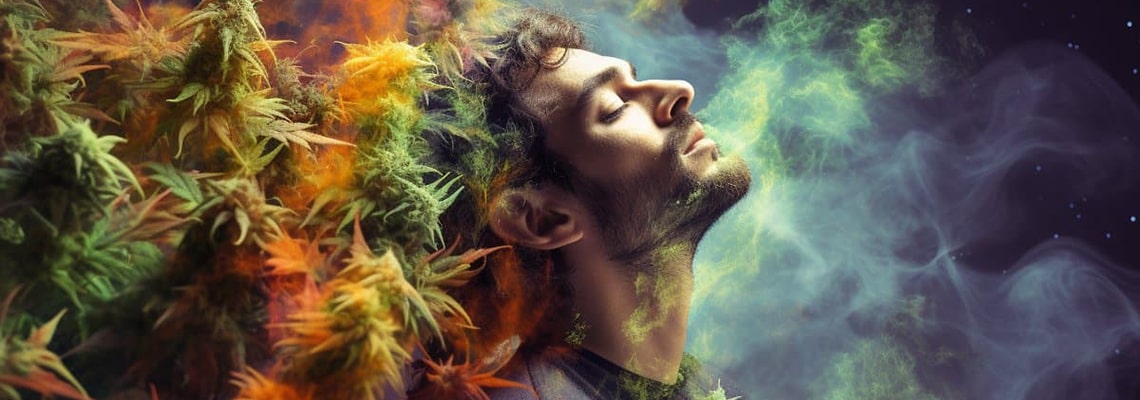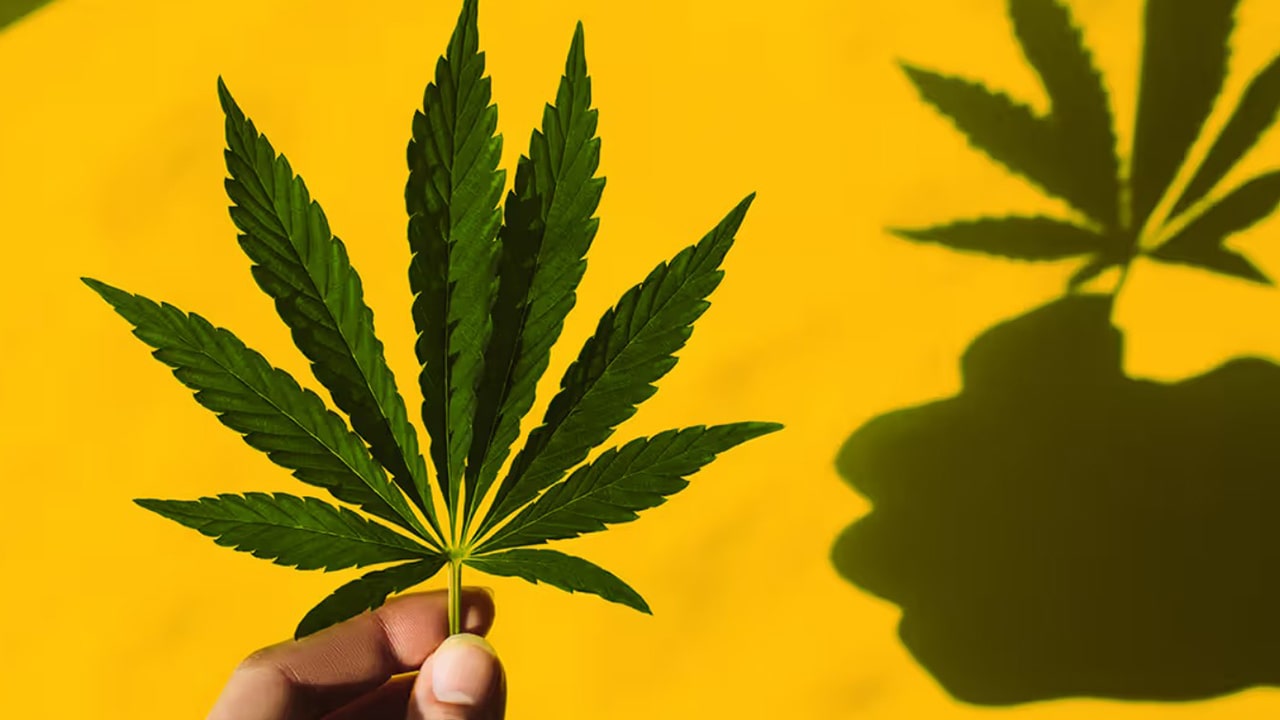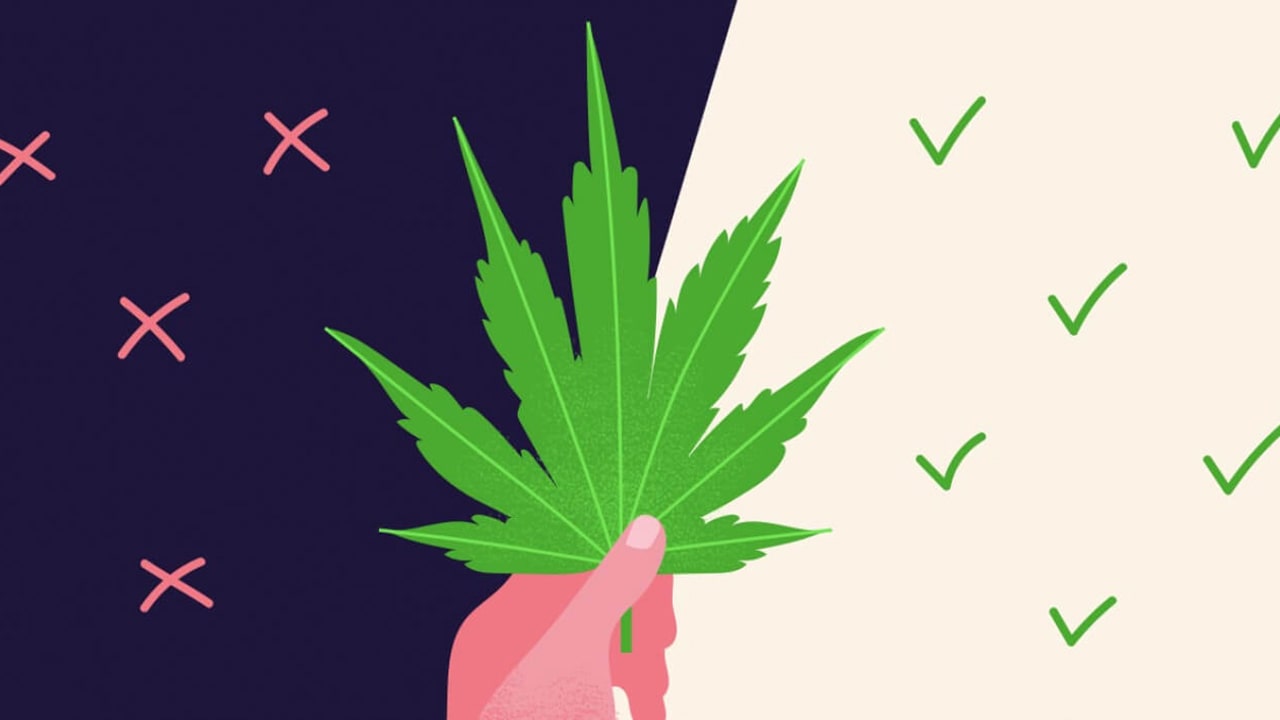There seems to be nothing in your cart.
Didn't find what you were looking for? Contact our consultant.
To save your shopping cart until your next visit, create an account or register .
Browse our Hits sales
There seems to be nothing in your cart.
Didn't find what you were looking for? Contact our consultant.
To save your shopping cart until your next visit, create an account or register .
Browse our Hits sales

Content
Cannabis has a multifaceted effect on the human nervous system through its active components, cannabinoids such as THC (tetrahydrocannabinol) and CBD (cannabidiol). These substances interact with the body's endocannabinoid system, which regulates many physiological processes, including mood, pain threshold, appetite and stress levels.
Tetrahydrocannabinol (THC), the main psychoactive component of cannabis, plays a key role in altering perception and psycho-emotional state. It binds to CB1 and CB2 receptors in the brain and central nervous system, resulting in intense relaxation and feelings of euphoria. This effect helps to reduce stress and anxiety, which is useful in treating neuroses and other nervous system disorders. THC also helps in normalizing sleep, which is an important aspect in chronic insomnia that often accompanies anxiety disorders.
Cannabidiol (CBD), on the other hand, has much less psychoactive properties but also has significant effects on the nervous system. CBD interacts with the same receptors as THC, but acts more mildly, without a pronounced “intoxicating” effect. It has a calming effect and can reduce anxiety, making it useful for treating mental disorders such as depression and anxiety. The effect of CBD on the brain is due to its antipsychotic properties, which help regulate nerve impulses and stabilize the patient's psycho-emotional state.
Among the different varieties of cannabis, indica varieties are often used to treat nervous disorders. They are known for their relaxing and calming effects that help relieve tension, reduce stress, and relax muscles. Indica promotes deep relaxation, which makes it particularly useful for nervousness, insomnia, and chronic anxiety. Unlike sativa, which can be more energizing and stimulating, indica has a mild but steady calming effect on the nervous system, which is ideal for people suffering from neurosis.
Cannabis also has an effect on neurotransmitters, which are chemicals that transmit signals between neurons. This allows cannabis to modulate pain perception, improve mood and reduce stress levels. Cannabinoids such as THC and CBD can affect serotonin and dopamine levels, which helps to improve psycho-emotional background and helps in the treatment of anxiety disorders.
Thus, the effects of cannabis on the nervous system are multifaceted and depend on the ratio of THC to CBD in a particular strain. Indica varieties, thanks to their calming and relaxing properties, have a significant effect on the nervous system, helping to combat neuroses, depression and chronic stress.

Neuroses, which are characterized by chronic stress, anxiety and emotional instability, are among the most common mental disorders. Treating neuroses with cannabis can be very effective, especially if herbal preparations containing cannabinoids are used. The effects of cannabis on the nervous system help to reduce symptoms of anxiety and depression by having a calming and relaxing effect on the body. Let's take a look at exactly how cannabis helps in the treatment of neuroses.
Thus, cannabis, thanks to its active substances such as THC and CBD, can significantly facilitate the treatment of neuroses. The calming effects, anxiety reduction and support for psychotherapeutic treatment make cannabis an effective tool in the fight against neuroses and anxiety disorders. Indica- and sativa-dominant varieties can be used depending on the patient's needs, providing both relaxation and sedation as well as increased energy and mood enhancement.

Medical cannabis is an effective treatment for a variety of mental illnesses, including depression, anxiety and neuroses. Due to its active ingredients such as cannabinoids, particularly CBD (cannabidiol) and THC (tetrahydrocannabinol), cannabis can improve a patient's psycho-emotional state and have a positive effect on the nervous system. In this section, we will look at the mental health benefits of medical cannabis, focusing on its effects on anxiety, stress, and depression.
CBD, unlike THC, has no psychoactive properties, but it has a pronounced calming effect. It lowers anxiety levels, reduces stress and promotes relaxation. This cannabinoid works with the body's endocannabinoid system to regulate the balance of neurotransmitters such as serotonin and dopamine, which are responsible for mood and stress responses.
When a person is faced with anxiety, serotonin levels are often low, leading to negative emotions. CBD helps normalize these levels, which helps improve overall psycho-emotional well-being.
One of the most pronounced benefits of medical cannabis is its ability to have antipsychotic and antidepressant effects. Studies show that CBD can be useful in treating depression, especially when other methods prove ineffective. CBD interacts with serotonin receptors in the brain, which helps improve mood and reduce symptoms of depression.
The effect of cannabis on the nervous system helps people with neuroses to get rid of chronic stress, improve quality of life and stabilize their emotional state. Cannabis, thanks to its properties, has a mild but long-lasting therapeutic effect, which contributes to the restoration of mental health.
Chronic stress is a constant tension that has a devastating effect on mental and physical health. Cannabis, especially high in CBD, promotes tension relief and relaxation, which helps to effectively manage the symptoms of stress. Unlike traditional stress relievers, cannabis has a mild but long-lasting effect, helping to avoid side effects and addiction.
Cannabis helps reduce cortisol levels, a stress hormone that affects all body systems. Regular use of medical cannabis can lead to stabilization of stress levels and recovery of the nervous system.
Medical cannabis is also used extensively in psychotherapy to improve the outcome of mental health treatment. It helps patients to relax and reduce anxiety levels, which facilitates more open and productive communication during psychotherapy sessions. CBD's effect on the nervous system allows patients to better perceive and process emotional blockages, which speeds up the healing process.
Comparison of the effects of cannabis with different levels of CBD and THC
| Cannabinoid | Main effects | Mental health benefits |
| CBD | Sedative, antipsychotic. | Reducing anxiety, improving mood, relieving stress and depression |
| THC | Psychoactive, relaxing | Eliminate stress, increase euphoria, improve sleep quality |
| CBD and THC blend | Balanced action | Providing deep relaxation and therapeutic effect, minimizing side effects |
As can be seen from the table, CBD is the main component that helps relieve anxiety and stress without causing psychoactive effects, while THC can add a relaxing and euphoric effect. The combined use of these cannabinoids maximizes therapeutic efficacy for people suffering from neurosis and depression.
Each year, more and more studies confirm that medical cannabis can play an important role in the treatment of mental health disorders. CBD, in particular, is becoming increasingly popular in psychotherapeutic practice, as its mental health benefits are clear. In the future, cannabis may become part of a comprehensive treatment for neuroses, depression, anxiety disorders, and other nervous system disorders.
Medical cannabis, thanks to its unique properties, can improve psycho-emotional state, reduce stress and anxiety levels, and help to restore mental health.

Attention! Errors Seeds does not encourage you to grow cannabis and does not promote it in any way. Cultivation is prohibited by the legislation of Ukraine. The article is of scientific and introductory interest only.